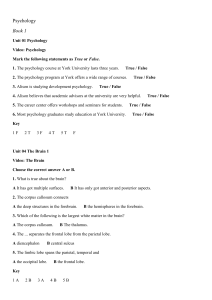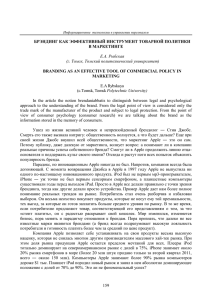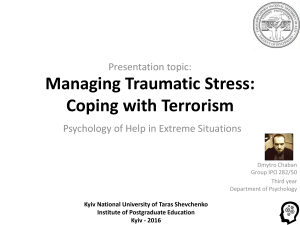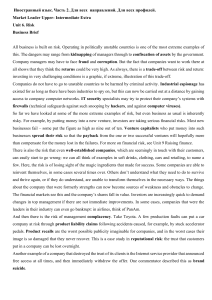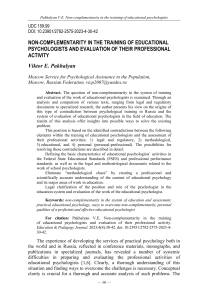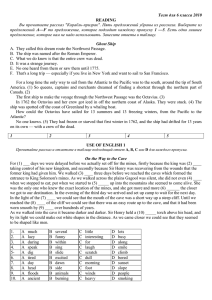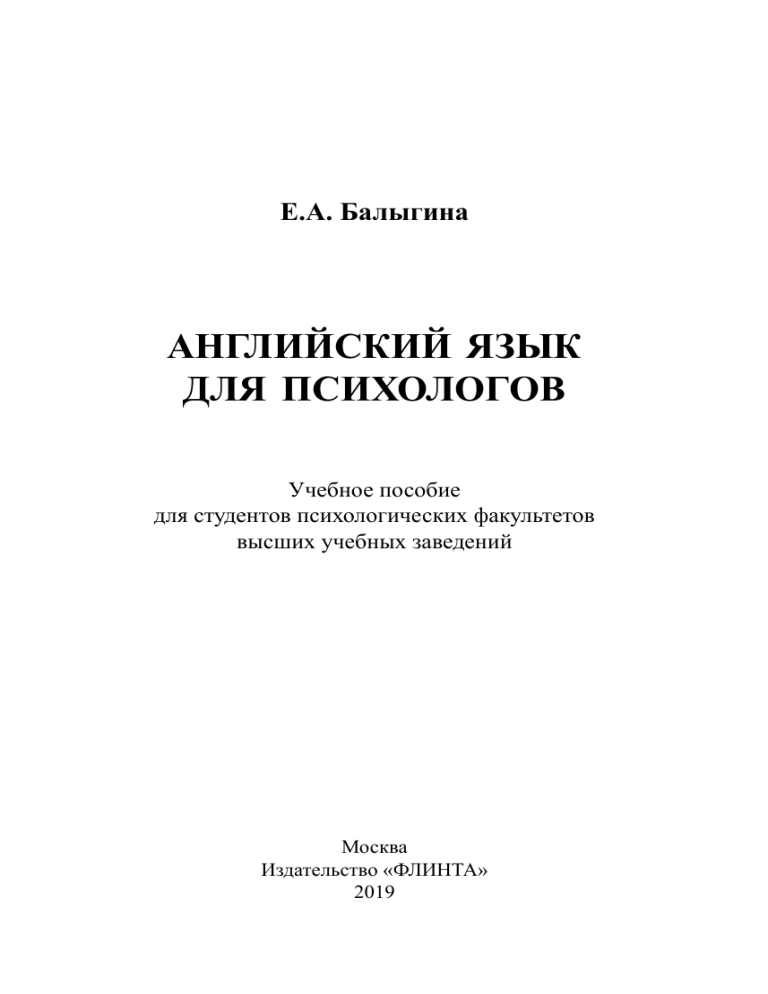
Е.А. Балыгина АНГЛИЙСКИЙ ЯЗЫК ДЛЯ ПСИХОЛОГОВ Учебное пособие для студентов психологических факультетов высших учебных заведений Москва Издательство «ФЛИНТА» 2019 1 УДК 811.111(075.8) ББК 81.432.1я73 Б21 Одобрено на заседании учебно-методического совета кафедры зарубежной и русской филологии Московского государственного психолого-педагогического университета (МГППУ) (протокол № 6 от 14 мая 2018 г.). Б21 Балыгина Е.А. Английский язык для психологов [Электронный ресурс] : учеб. пособие / Е.А. Балыгина. М. : ФЛИНТА, 2019. 359 с. ISBN 978-5-9765-4000-2 Пособие «Английский язык для психологов» написано в соответствии с программой подготовки психологов по курсу «Иностранный язык». В качестве учебного материала предлагаются адаптированные психологические тексты, соответствующие потребностям студентов имеющих средний уровень языковой подготовки (intermediate). Пособие подразделяется на тематические разделы: Psychology as a science, Historical and Contemporary approaches to psychology, Organization of the nervous system и другие. Основной текст каждого урока сопровождается упражнениями, которые не только формируют лексическую и грамматическую компетенции, но и представляют дополнительные сведения об изучаемой психологической теме. Каждый тематический блок включает коммуникативные задания, содержащие вопросы для дискуссий. Пособие предназначено для студентов психологических факультетов высших учебных заведений. УДК 811.111(075.8) ББК 81.432.1я73 ISBN 978-5-9765-4000-2 © Балыгина Е.А., 2019 © Издательство «ФЛИНТА», 2019 2 CONTENTS Предисловие .................................................................................................... 5 UNIT 1. Psychology as a Science ................................................................... 7 1.1. What is science? ......................................................................................... 8 1.2. Scienti�c methods in psychology ............................................................. 18 UNIT 2. Historical and Contemporary Approaches to Psychology ......... 37 2.1. Wilhelm Wundt and Voluntarism ............................................................. 39 2.2. Edward Titchener and Structuralism ........................................................ 49 2.3. Behaviorism: from Pavlov to Watson ...................................................... 60 2.4. John Watson and Behaviorism ................................................................. 70 2.5. Humanistic psychology ............................................................................ 88 2.6. Cognitive psychology ............................................................................. 104 UNIT 3. Organization of the Nervous System .......................................... 117 3.1. The central nervous system .................................................................... 118 3.2. Peripheral nervous system ...................................................................... 128 UNIT 4. Brain Studies ................................................................................ 141 4.1. Clinical anatomical methods .................................................................. 142 4.2. Invasive anatomical methods ................................................................. 153 4.3. Non-invasive anatomical methods: Brain imaging ................................ 167 UNIT 5. Sleep Phenomenon ....................................................................... 180 5.1. Sleep research in the 20th century ......................................................... 182 5.2. Sleep as an Active Brain process ........................................................... 193 5.3. Functions of Sleep .................................................................................. 203 5.4. Why do we dream? ................................................................................. 214 UNIT 6. Visual Perception .......................................................................... 228 6.1. Sensation and Perception ....................................................................... 229 6.2. Perception as Unconscious Inference ..................................................... 241 6.3. Gestalt Theory of Visual Perception ...................................................... 254 3 UNIT 7. Theories of Emotion ..................................................................... 271 7.1. James-Lange theory ............................................................................... 272 7.2. Cannon-Bard theory ............................................................................... 282 7.3. The cognitive appraisal theory ............................................................... 292 UNIT 8. Theories of Attachment ............................................................... 303 8.1. Patterns of attachment ............................................................................ 305 8.2. Formal theories of attachment ................................................................ 318 8.3. Harlows experiments on attachment in monkeys ................................. 330 8.4. Bowlbys Attachment Theory ................................................................ 342 4 Предисловие Учебное пособие «Английский язык для психологов» предназначено для студентов-психологов, имеющих средний уровень языковой подготовки (intermediate). Реализуя требование Федерального государственного образовательного стандарта высшего образования (ФГОС ВО), большинство существующих учебников по иностранному языку для специальных целей в качестве учебного материала используют аутентичные тексты, имеющие профессиональную направленность. Однако практика преподавания иностранного языка в высшем учебном заведении показывает, что подобный подход сопряжён со значительными трудностями, обусловленными низким уровнем языковой подготовки студентов неязыковых специальностей. Использование учебного материала, требующего свободного владения языком, на занятиях в неязыковых группах зачастую приводит к тому, что обучающиеся вынуждены тратить большую часть учебного времени на преодоление языковых трудностей, утрачивая интерес к изучению языка как средству получения знаний в профессиональной сфере. В данном учебном пособии, реализующем принцип доступности учебного материала, предпринимается попытка решения проблемы одновременного развития языковых навыков и изучения предметной области «Психология». Высокий уровень доступности учебного материала, предлагаемого в учебном пособии, позволяет вовлечь будущих психологов в поиск профессиональной информации с опорой на знание иностранного языка. Изучая учебные психологические тексты среднего уровня сложности (intermediate), студент не только получает представление о лексической и грамматической системе языка, но и развивает умение применять лингвистические знания для получения профессиональной информации. 5 Логика изложения материала в каждом из разделов пособия определяется прежде всего необходимостью максимально полного раскрытия некоторых аспектов рассматриваемой психологической темы. После каждого изучаемого текста предлагаются вопросы, проверяющие не только понимание текста, но и знание основных понятий и положений изучаемых психологических теорий. Упражнения, формирующие лексическую и грамматическую компетенции, также подчинены задаче ознакомления студента со всеми аспектами изучаемой психологической темы. Вопросы, следующие после основного текста каждого раздела, позволяют вовлечь учащихся в целенаправленную коммуникативную деятельность на материале основного текста и следующих после него упражнений. Для ответа на вопросы студентам достаточно понять содержание основного текста и упражнений изучаемого раздела. Подобный подход к отбору учебного материала, направленный на максимально полное освещение изучаемой психологической темы, создаёт условия для вовлечения в иноязычное профессионально ориентированное общение студентов первого и второго курсов, которые зачастую не обладают достаточно высоким уровнем предметных знаний. Таким образом учебное пособие содержит доступный учебный материал, организация которого определяется необходимостью интеграции лингвистических и профессионально ориентированных знаний и навыков при обучении иностранному языку для специальных целей в неязыковом вузе. 6 UNIT 1 Psychology as a Science Unit outline 1.1. What is science? 1.2. Scienti�c methods in psychology Learning objectives 1. What makes psychology a science? 2. How does psychology differ from false explanations of behavior? 3. Explain why using our intuition about everyday behavior is insuf�cient for a complete understanding of the causes of behavior. 4. What are the basic steps of scienti�c study? 5. How do differences in behavior relate to differences in heredity (nature)? 6. What is the impact of social experience (nurture) on a persons psychological characteristics? Key points � � � � � Psychology is the scienti�c study of mind and behavior. Psychologists use the scienti�c method to collect, analyze, and interpret evidence. Employing the scienti�c method allows the scientist to collect empirical data objectively. A scienti�c study goes through the following sequence of steps: hypothesis, method and results. Psychologists commonly use three types of research: descriptive (observation, surveys and interviews, and case studies), correlational and experimental ones. 7 1.1. What is science? approach [əprəuʧ] подход attempt [ətempt] пытаться common [kɔmən] общепринятый, распространённый concern [kənsɜːn] интерес, участие, заинтересованное отношение de�ne [dɪ'faɪn] давать определение (какому-л. понятию) de�nition [ˌdefɪ'nɪʃ(ə)n] определение, дефиниция derive from происходить от directly [daɪ'rektlɪ] непосредственно (без посредников) examine [ɪgzæmɪn] исследовать; изучать experience [ɪkspɪərɪəns] опыт explain / account for объяснять heritage [herɪtɪʤ] наследство; наследие mind [maɪnd] 1) разум, ум; 2) мышление, умственная деятельность observation [ˌɔbzəveɪʃən] наблюдение observe [əbzɜːv] наблюдать perception [pəsepʃən] восприятие refer [rɪ'fɜː] / (refer to) указывать, обозначать science [saɪəns] наука scienti�c [ˌsaɪəntɪfɪk] научный separate [sepərət] отдельный similarity [ˌsɪmɪlærətɪ] подобие, сходство the ancients древние народы thought [θɔːt] / thinking (от think) мысль; мышление When you think of the word psychology, what �rst comes to mind? The word psychology is derived from the Greek psyche [saɪkɪ] (mind, soul or spirit) and logos (study). Psychology is the study of mind. Psychology is the scienti�c study of behavior and mental processes. What does behavior refer to in the de�nition of psychology? Behavior is anything you do eating, sleeping, talking, or sneezing. 8 Mental processes are the thoughts, feelings, and motives. Although we cannot directly see thoughts and feelings, they are real. They include thinking about kissing someone, a babys feelings when its mother leaves the room, and a students memory of a motorcycle trip. So, psychology means the study of the psyche, or mind, and this study is as old as the human species. The ancients, for example, attempted to account for dreams, mental illness, emotions, and fantasies. Was this psychology? Or did psychology start when explanations of human cognitive experience became more systematic? Plato [pleɪtəu] and Aristotle [ˈarɪstɒtəl], for example, created theories that attempted to account for such processes as memory, perception, and learning. Is this the point at which psychology started? Or did psychology start when it became a separate science in the 19th century? It is common these days to begin a history of psychology at the point where psychology became a separate science. This approach is unsatisfactory because it ignores the philosophical heritage that made psychology the type of science that it became. What is science? At various times in history, in�uential individuals (such as Galileo [ˌgalɪˈleɪəʊ] and Kant) have said that psychology could never be a science because of its concern with subjective experience. To answer the question of whether psychology is a science we must �rst attempt to de�ne science. Science is a way of answering questions about nature by examining nature directly, rather than by depending on church dogma [dɔgmə] or abstract thought processes alone. From the very beginning the focus of psychology has been empirical observation (that is, the direct observation of nature), but there is more to science than simply observing nature. To be useful, observations must be organized in some way. After noting 9 similarities and differences among observations, many scientists attempt to explain what they have observed. Science, then, has two major components: (1) empirical observation and (2) theory. Here we have the two essential elements [elɪmənts] of modern science: the making of observations is the empirical or factual component, and the systematic attempt to explain these facts is the theoretical component. EX. 1. Answer the questions below. 1. What is psychology? 2. What is behavior? What is a mental process? 3. What processes did Plato [pleɪtəu] and Aristotle [ˈarɪstɒtəl] attempt to account for? 4. Why is it important to study the history of psychology? 5. Why did Galileo [ˌgalɪˈleɪəʊ] and Kant think that psychology could never be a science? 6. What is a science? What are two major components of science? 7. What makes psychology a science? How does psychology differ from false explanations of behavior? 8. How can we study the mind if we cant observe it? 9. Would you agree that psychology can be considered a science? EX. 2. Fill in the gaps with the most suitable words. actions thinking study Psychology is the systematic, scienti�c ________ (1) of behaviors and mental processes. Behavior refers to observable ________ (2) or responses in both humans and animals. 10 Mental processes, which are not directly observable, refer to a wide range of complex mental processes, such as ________ (3), imagining, studying, and dreaming. ✓ observable [əbzɜːvəbl] наблюдаемый, поддающийся наблюдению EX. 3. Fill in the gaps with the following words. thoughts experience approach observed DEFINING PSYCHOLOGY Psychology is the scienti�c study of human behavior and mental processes. Psychologists ________ (1) human behavior as scientists who are skeptical and objective. Behavior includes everything organisms do that can be ________ (2). Mental processes are ________ (3), feelings, and motives. As a truly general science, psychology addresses all sides of human ________ (4) positive and negative, strengths and weaknesses. EX. 4. Choose the most suitable verb form. In the late 1800s and early 1900s, psychology was de�ned / de�ning as the scienti�c study of the mind. Around 1920, psychologists became disappointing / disappointed with the idea of studying the mind. The reason was that science deals with what we can observe / be observed, and no one can observe / be observed a mind. Anyway, through the mid-1900s, psychologists de�ned / de�ning their �eld simply as the study of behavior. However, people care about what they feel and think, not just about what they do. 11 So for a compromise, lets de�ned / de�ne psychology as the systematic study of behavior and experience. EX. 5. Fill in the gaps with the most suitable words. de�nition idea behavior describe goal predict Although the current ________ (1) of psychology is very broad, psychologists usually have four speci�c goals in mind when they study some behavior or mental process. The �rst goal of psychology is to ________ (2) the different ways that organisms behave. The second goal of psychology is to explain the causes of ________ (3). Being able to describe and explain behavior helps psychologists reach the third ________ (4), which is to predict behavior. If psychologists can ________ (5) behavior, then they can often control behavior. However, the ________ (6) of control has both positive and negative sides. EX. 6. Fill in the gaps with the most suitable words. invented method behavior observation Many �elds, such as history, law, art, and business, are also interested in human ___________ (1). How is psychology different? Psychologys great strength is that it uses scienti�c ____________ (2) to systematically answer questions about behavior. Questions sometimes go unanswered for lack of a suitable research ___________ (3) (a systematic process for answering scienti�c questions). In the past, for example, we had to take the word of people who say they never dream. Then the EEG (electroencephalograph) was ______________ (4). 12 EX. 7. Fill in the gaps with the most suitable words. likely occurred devise describe to predict BYSTANDER APATHY Researchers might be interested in knowing whether individuals will help a stranger who has fallen down. The researchers could __________ (1) a study in which they observe people walking past a person who needs help. The researchers could __________ (2) helping behavior by counting how many times it occurs. The researchers may also examine characteristics of the individuals studied and try __________ (3) who will help, and when. Are happy people more ____________ (4) to help? Are women or men more likely to help? After psychologists have analyzed their data, they also will want to explain why helping behavior __________ (5) when it did. ✓ devise разрабатывать, продумывать (планы, идеи); выдумы✓ ✓ ✓ ✓ вать, изобретать observation наблюдение observe наблюдать occur происходить, случаться, совершаться researcher научный работник; исследователь; учёный EX. 8. Fill in the gaps with the most suitable words. unwilling fail likely observations description Answering psychological questions often begins with a careful __________ (1) of behavior. Description, or naming and classifying, is typically based on making a detailed record of scienti�c __________ (2). 13 But a description doesnt explain anything, does it? Right. Descriptions cant answer the important why questions. Why are people more aggressive when they are uncomfortable? Why are bystanders often __________ (3) to help in an emergency? Understanding usually means we can explain a behavior. For example, research on bystander apathy �nds that people often __________ (4) to help when other possible helpers are nearby. Why? Because no one feels personally obligated to help. As a result, the more potential helpers there are, the less __________ (5) it is that anyone will help. Now we can explain a complex problem. ✓ ✓ ✓ ✓ fail не сделать, потерпеть неудачу likely вероятный, возможный obligate обязывать unwilling нежелающий (что-л. делать) EX. 9. Fill in the gaps with the most suitable words. accuracy guarantee predict prediction Explaining a behavior means that we can __________ (1) behavior accurately. Notice that our explanation of bystander apathy makes a __________ (2) about the chances of getting help. If youve ever been stranded on a busy freeway with car trouble, youll see the __________ (3) of this prediction: Having many potential helpers nearby is no __________ (4) that anyone will stop to help. ✓ ✓ ✓ ✓ ✓ ✓ a goal цель accuracy правильность, точность accurately точно examine исследовать, изучать predict предсказывать, прогнозировать prediction прогноз 14 EX. 10. Fill in the gaps with the most suitable words. scienti�c observation regarded perception The �rst western thinker to study psychological topics, Aristotle [ˈarɪstɒtəl] (384322 BCE) combined the logic of philosophy with empirical __________ (1). His best known psychological work, De Anima («О душе»), is __________ (2) as the �rst systematic treatise [triːtɪz] on psychology. Its range of topics includes such basic psychological processes as the senses, __________ (3), memory, thinking, and motivation. Aristotles writings on psychology anticipated topics and theories that would be central to __________ (4) psychology centuries later. ✓ anticipate предвосхищать, предугадывать EX. 11. Fill in the gaps with the most suitable words. behavior abilities observation knowledge сlaims an approach PSYCHOLOGY AS A POWERFUL WAY OF THINKING We often hear claims about psychological issues. For instance, we hear claims that men and women have different __________ (1) or that violence on television has a harmful effect on children. As a science, psychology demands that researchers ask questions about such issues and that they test their ideas through systematic __________ (2). In the long run, this means that psychology provides a way of building __________ (3) that is relatively accurate and dependable. Of course, psychological research cannot discover an answer for every interesting question about the mind and __________ (4). You wont �nd the meaning of life or the secret of happiness in this textbook. But you will �nd __________ (5) to investigating questions that has proven to be fruitful. 15 The more you learn about psychology as a way of thinking, the better able you will be to evaluate the psychological __________ (6) you hear in daily life. ✓ ✓ ✓ ✓ ✓ accurate [ækjərət] правильный, точный approach [ə'prəuʧ] подход (к решению проблемы, задачи) claim [kleɪm] заявление, утверждение demand [dɪ'mɑːnd] требовать, предъявлять требование dependable [dɪ'pendəbl] надёжный, заслуживающий доверия ✓ evaluate [ɪ'væljueɪt] оценивать, давать оценку, составлять мнение ✓ observation [ˌɔbzə'veɪʃən] наблюдение ✓ provide [prə'vaɪd] давать, предоставлять, обеспечивать EX. 12. Fill in the gaps with the most suitable words. re�ections philosophy mind founder discipline issues FROM SPECULATION TO SCIENCE: HOW PSYCHOLOGY DEVELOPED Of course, people have always wondered about the mysteries of the _________ (1). In that sense, psychology is as old as the human race. But it was only a little over 125 years ago that psychology emerged as a _________ (2). Psychologys intellectual parents were the disciplines of ________ (3) and physiology [ˌfɪzɪɔləʤɪ]. By the 1870s a small number of scholars in both �elds were actively exploring questions about the mind. Are peoples perceptions of the world accurate _________ (4) of reality? How do mind and body interact? The philosophers and physiologists who were interested in the mind viewed such questions as interesting _________ (5) within 16 their �elds. It was a German professor, Wilhelm Wundt (1832 1920), who changed this view. Wundt tried to make psychology an independent discipline rather than a stepchild of philosophy or physiology. Today he is widely characterized as the _________ (6) of psychology. ✓ ✓ ✓ ✓ emerge [ɪ'mɜːʤ] появляться, возникать explore [ɪksplɔː] исследовать, рассматривать, изучать interact [ˌɪntər'ækt] взаимодействовать, влиять друг на друга re�ection [rɪ'�ekʃən] отражение EX. 13. Choose the most suitable verb form. A NEW SCIENCE IS BORN Borrowing / Borrowed from his training in physiology, Wundt (1874) declared that the new psychology should be a science was modelled / modeled after �elds such as physics and chemistry. What was the subject matter of the new science? According to Wundt, psychologys primary focus has been / was consciousness the awareness of immediate experience. Wilhelm Wundt said that physiology informing / informs us about those life phenomena that we perceive / are perceived by our external senses; in psychology, the person looks upon himself as from within and tries to explain / explaining the processes that this internal observation discloses. Thus, psychology became / has become the scienti�c study of conscious experience. This orientation kept psychology focuses / focused on the mind and mental processes. But it demanded that the methods psychologists were used / used to investigate the mind be as scienti�c as those of chemists or physicists. ✓ awareness [ə'weənəs] осознание; осведомлённость ✓ borrow [bɔrəu] заимствовать, перенимать ✓ disclose [dɪs'kləuz] выявлять, обнаруживать 17 ✓ ✓ ✓ ✓ external [ɪkstɜːnəl] внешний internal [ɪn'tɜːnəl] внутренний investigate [ɪn'vestɪgeɪt] изучать, исследовать model [mɔdəl] создавать, конструировать (на основе каких-л. принципов) ✓ within [wɪ'ðɪn] в, внутри (выражает отношения места) 1.2. Scienti�c methods in psychology a cause-and-effect conclusion вывод о наличии причинно-следственной связи abandon [ə'bændən] отказываться (от чего-л.) apply [ə'plaɪ] применять (to) approach подход (к решению проблемы, задачи и т.п.) beyond далее, за пределы circumstance [sɜːkəmstæns] обстоятельство collect собирать conclude cause [kɔːz] and effect [ɪ'fekt] сделать вывод о наличии причинно-следственной связи contradict [ˌkɔntrə'dɪkt] противоречить count включать, принимать во внимание determine [dɪ'tɜːmɪn] определять, устанавливать devise [dɪ'vaɪz] разрабатывать, изобретать engage in smth заниматься чем-л., быть занятым чем-л. imitate подражать; имитировать justify 1) оправдывать, объяснять; 2) подтверждать, доказывать likely ['laɪklɪ] вероятный, возможный measure [meʒə] измерять relationship взаимосвязь, связь researcher исследователь sequence [siːkwəns] последовательность strength достоинство, сильная сторона support подтверждать; подкреплять; свидетельствовать в пользу (кого-, чего-л.) 18 threat опасность, угроза variable ['veərɪəbl] переменная (величина) violence жестокость, насилие violent агрессивный, насильственный weakness слабое место, недостаток A scienti�c study goes through the following sequence of steps: hypothesis, method and results. Research ordinarily begins with careful observations. In psychology, researchers observe what people do, under what circumstances, and how one person differs from another. For example, in a study on laughter, Robert Provine simply recorded who laughed and when and where. Then, researchers want to go beyond observations to try to explain what they see. To explain their observations, researchers form a hypothesis, which is a statement such as people who watch violent television programs will act more violently. 1. A hypothesis. A hypothesis is a statement about the relationship between two or more variables. A hypothesis can be based on observations, such as noticing that some children who watch much violence on television are themselves aggressive. A hypothesis can also be based on a larger theory, such as children tend to imitate the behavior they see, so those who watch a great deal of violence on television will themselves become more violent. 2. A method. Any hypothesis could be tested in many ways, and almost any method has its strengths and weaknesses. One way to test the effects of violent TV shows would be to examine whether children who watch more violent programs engage in more violent behavior. The main limit of this approach is that we cannot conclude cause and 19 effect: Watching violence may lead to violence, but it is also likely that people who are already violent like to watch violence. Another method is to take a set of children, let some of them watch violent programs while others watch nonviolent programs, and see whether the two groups differ in their violent behaviors. That kind of study can justify a cause-and-effect conclusion if indeed the groups differ. 3. Results. Fundamental to any research is collecting and then interpreting the results. A phenomenon such as violent behavior can be especially dif�cult to measure. How do we decide what is real violence and what is just playfulness? Do threats count? Another problem is that the results may apply only to certain kinds of people or only under certain circumstances. The �nal task is to determine what the results mean. If results support the hypothesis, investigators gain con�dence in their hypothesis. If they clearly contradict the hypothesis, researchers should either abandon or modify the original hypothesis. Thus, researchers form a hypothesis, devise a method to test it, collect results, and then interpret the results. Most articles in scienti�c publications follow this sequence too. EX. 1. Answer the questions below. 1. 2. 3. 4. What are the basic steps of scienti�c study? What is a hypothesis? How could a hypothesis be scienti�cally tested? What can a hypothesis watching violence leads to more violent behavior be based on? 5. How can we test the effects of violent TV shows? 6. What problems are involved in collecting and interpreting the results of the study? 20 7. What methods should be used to investigate psychological issues? EX. 2. Fill in the gaps with the most suitable words. fonder empirical scienti�c directly Scienti�c observation is based on gathering __________ (1) evidence (information gained from direct observation). Unlike personal observation, __________ (2) observation is systematic and objective. We study behavior __________ (3) and collect data (observed facts) so that we can draw valid conclusions. Would you say its true, for instance, that Absence makes the heart grow fonder (Дальше с глаз ближе к сердцу)? Why argue about it? As psychologists, we would simply get some people who are separated (absent hearts) and some who see each other every day (present hearts) and �nd out who is _________ (4) of their loved ones! ✓ ✓ ✓ ✓ ✓ draw a conclusion делать вывод evidence доказательство, подтверждение, свидетельство gain получать, приобретать gather собирать, накоплять, приобретать valid обоснованный (довод, возражение) EX. 3. Fill in the gaps with the most suitable words. differences observations predictions observing variables OBSERVING SOME PHENOMENON The �rst step in a scienti�c study involves __________ (1) some phenomenon in the world. The critically thinking psychologist sees 21 something in the world and wants to know why or how it is the way it is. The phenomena that scientists study are called __________ (2), a word related to the verb to vary. A variable is anything that can change. For example, one variable that interests psychologists is happiness. Some people seem to be generally happier than others. What might account for these __________ (3)? As scientists consider answers to such questions, they often develop theories. A theory is a broad idea or set of closely related ideas that attempts to explain __________ (4). Theories tell us about the relationships between variables on a conceptual level. Theories seek to explain why certain things have happened, and they can be used to make __________ (5) about future observations. For instance, some psychologists theorize that the most important human need is the need to belong to a social group. ✓ variable [veərɪəbl] переменная (величина) EX. 4. Fill in the gaps with the most suitable words. functioning relationship prediction social groups FORMULATING HYPOTHESES AND PREDICTIONS The second step in a scienti�c study is stating a hypothesis. A hypothesis is a statement about the __________ (1) between two or more variables. It is a __________ (2) that can be tested. A theory can generate many hypotheses. So, a researcher who believes that social belonging is the most important aspect of human functioning might predict that people who belong to __________ (3) will be happier than those who do not. Another hypothesis from the theory that belongingness is important to human __________ (4) might be that individuals who have been 22 socially excluded should feel less happy than those who have been socially included. EX. 5. Fill in the gaps with the most suitable words. de�ne measures research predictions variables TESTING THROUGH EMPIRICAL RESEARCH The next step in a scienti�c study is to test the hypothesis by conducting empirical __________ (1), that is, by collecting and analyzing data. At this point, it is time to design a study that will test __________ (2) that are based on the theory. To do so, a researcher �rst needs a concrete [kɔŋkriːt] way to measure the __________ (3) of interest. Imagine, for instance, that everyone in your psychology class is asked to observe a group of children and to keep track of kind behaviors. Do you think that all your classmates will __________ (4) kind behaviors in the same way? So, �rst of all you will have to ensure that everyone agrees on what a variable means. To measure personal happiness, for example, prominent psychologist Ed Diener (1985) devised a self-report questionnaire that __________ (5) how satis�ed a person is with his or her life, called the Satisfaction with Life Scale. Scores on this questionnaire are then used as measures of happiness. EX. 6. Fill in the gaps with the most suitable words. results methods conclusions researchers DRAWING CONCLUSIONS Based on the results of the data analyses, scientists then draw __________ (1) from their research. 23 If the results clearly contradict the hypothesis, __________ (2) should either abandon or modify the original hypothesis. Then, a theory which the hypothesis is based on might be revised. However, a theory is revised only after a number of studies produce similar __________ (3) and all of them contradict the hypothesis. Before we change a theory, we want to be sure that the research can be repeated by other scientists using different __________ (4). EX. 7. Choose the most suitable verb form. FORMULATING A HYPOTHESIS: DO DOGS LOOK LIKE THEIR OWNERS? Hypotheses are often generated / generate from everyday observations. For example, many people believe that pets resemble their owners. How could this hypothesis be scienti�cally testing / tested? Psychologists Michael Roy and Nicholas Christenfeld found that study participants were / be able to accurately match photos of dogs with photos of their owners but only if the dogs were purebred. Other research has come / coming to the same conclusion. The explanation? People tend to choose dogs that resembling / resemble themselves. ✓ ✓ ✓ ✓ generate порождать, создавать match подбирать (под пару, по цвету, форме и т.п.), сочетать a participant участник resemble походить, иметь сходство EX. 8. Fill in the gaps with the most suitable words. observers behaviors observing related de�ne research Descriptive research methods are strategies for __________ (1) and describing behavior. Using descriptive methods, researchers can 24 answer important questions, such as when certain behaviors take place, how often they occur, and whether they are __________ (2) to other factors, such as a persons age, ethnic group, or educational level. As you might expect, psychologists very carefully __________ (3) the behaviors that they will observe and measure before they begin their __________ (4). Often, to increase the accuracy of the observations, two or more __________ (5) are used. In some studies, observations are recorded so that the researchers can carefully analyze the details of the __________ (6) being studied. ✓ ✓ ✓ ✓ accuracy точность describe описывать educational образовательный occur происходить, случаться, совершаться EX. 9. Choose the most suitable verb form. Science seeks to discover lawful relationships. A scienti�c law can de�ne / be de�ned as a consistently observed relationship between two or more classes of empirical events. For example, when X occurs, Y also tends occur / to occur. Science, then, uses theories to be found / to �nd and explain lawful, empirical events. Traditionally, science is not interested in unique events but in general laws that can be publicly observed / observing and veri�ed. That is, a scienti�c law is general and, because it describing / describes a relationship between empirical events, can be publicly observe / observed. EX. 10. Choose the most suitable verb form. A goal of science is discover / to discover the causes of natural phenomena. Specifying / Specify the causes of natural events, however, is highly complex and usually requires experimental research. The problem is that events seldom, if ever, have a single 25 cause; rather, they having / have multiple causes. Questions such as What caused the Second World War? and What causes schizophrenia [ˌskɪtsəfriːnɪə]? are still far from answer / answered. Even simpler questions such as Why did John quit his job? or Why did Jane marry John? are, in reality, enormously complex. ✓ consistent устойчивый, последовательный, стойкий EX. 11. Fill in the gaps with the following phrases. A. B. C. D. E. either of them shorter people better paying jobs cause-and-effect conclusions the risk of schizophrenia CORRELATION DOES NOT INDICATE CAUSATION A correlation indicates that two things tend to go together. For example, taller people tend to be heavier than ___________ (1), on the average. Better educated people tend to have ___________ (2) than less educated people. And so forth. Sometimes, we are tempted to draw ___________ (3) after observing a correlation. For example, people with schizophrenia are more likely than other people to abuse alcohol, tobacco, and marijuana. Although we might be tempted to assume that these substances increase ___________ (4), we cannot draw that conclusion. It is equally plausible that having schizophrenia increases ones uses of alcohol and tobacco. That is, a correlation between two items does not tell us which one caused the other or, indeed, whether ___________ (5) caused the other. 26 ✓ causation причинность, причинная обусловленность ✓ correlation соотношение; взаимосвязь EX. 12. Fill in the gaps with the following words. observation determining occurs causes DESCRIPTIVE RESEARCH Just as its name suggests, descriptive research is about describing some phenomenon ________ (1) its basic dimensions and de�ning what this thing is, how often it ________ (2), and so on. By itself, descriptive research cannot prove what ________ (3) some phenomenon, but it can reveal important information about peoples behaviors and attitudes. Descriptive research methods include ________ (4), surveys and interviews, and case studies. EX. 13. Fill in the gaps with the following words. particular quickest related SURVEYS AND INTERVIEWS Sometimes the best and ________ (1) way to get information about people is to ask them for it. One technique is to interview them directly. A ________ (2) method that is especially useful when information from many people is needed is the survey, or questionnaire. A survey presents a standard set of questions, or items, to obtain peoples self-reported attitudes or beliefs about a ________ (3) topic. ✓ questionnaire [ˌkwesʧəneə] вопросник, анкета, опросный лист 27 EX. 14. Choose the most suitable verb form. CASE STUDIES A case study is an in-depth look at a single individual. Case studies are performed / perform mainly by clinical psychologists when, for either practical or ethical reasons, the unique aspects of an individuals life cannot be duplicated / duplicating and tested / testing in other individuals. A case study provides / providing information about one persons goals, hopes, fantasies, fears, traumatic experiences, family relationships, health, and anything else that helps the psychologist understand the persons mind and behavior. Case studies can also involve / be involved in-depth explorations of particular families or social groups. An example of a case study is the analysis of Indias spiritual leader Mahatma Gandhi (18691948) by psychodynamic theorist Erik Erikson. Erikson studied Gandhis life in great depth discovered / to discover how his positive spiritual identity developed, especially during his youth. ✓ duplicate повторять, копировать ✓ provide давать, предоставлять, обеспечивать ✓ perform делать, выполнять (какую-л. работу, задание и т.д.) EX. 15. Put the verbs in the right form. THE SEARCH FOR LAWS Another feature of science (be) that it seeks to discover lawful relationships. A scienti�c law can (de�ne) as a consistently observed relationship between two or more classes of empirical events. For example, when X occurs, Y also tends (occur). Science, then, uses theories (�nd) and (explain) lawful, empirical events. By (stress) lawfulness, science is proclaiming an interest in the general case rather than the particular case. 28 Traditionally, science is not interested in unique events but in general laws that can be publicly (observe) and (verify). That is, a scienti�c law is general and, because it (describe) a relationship between empirical events ✓ consistently ✓ ✓ ✓ ✓ ✓ ✓ [kənsɪstəntlɪ] устойчиво, постоянно, последовательно de�ne [dɪ'faɪn] определять, давать определение general [ʤenərəl] общий, общего характера (характерный для определённого класса, типа) lawful [lɔːfful] закономерный particular [pə'tɪkjələ] особенный, отдельный, одиночный proclaim [prə'kleɪm] провозглашать, объявлять verify ['verɪfaɪ] проверять, подтверждать EX. 16. Fill in the gaps with the following words. prevents predict vary tend discover considered There are two general classes of scienti�c laws. One class is correlational laws, which describe how classes of events _______ (1) together in some systematic way. For example, scores on intelligence tests _______ (2) to correlate with scores on creativity tests. That is, if we knew a persons score on an intelligence test, we could _______ (3) his or her score on a creativity test, and vice versa. A more powerful class of laws is causal laws, which specify how events are causally related. For example, if we knew the causes of a disease, we could predict and control that disease as removing the causes of a disease _______ (4) the disease from occurring. Thus, correlational laws allow prediction, but causal laws allow prediction and control. For this reason, causal laws are more powerful than correlational laws and thus are generally _______ (5) more desirable. 29 A major goal of science is to _______ (6) the causes of natural phenomena. ✓ causal [kɔːzəl] причинный; выражающий связь причины и ✓ ✓ ✓ ✓ ✓ ✓ ✓ ✓ следствия cause [kɔːz] причина correlate with находиться в связи, в определённом соотношении desirable [dɪ'zaɪərəbl] желательный predict [prɪ'dɪkt] предсказывать, прогнозировать prediction [prɪ'dɪkʃən] предсказание, прогноз prevent [prɪ'vent] предотвращать, препятствовать specify ['spesɪfaɪ] точно определять, устанавливать vary ['veərɪ] меняться, изменяться EX. 17. Choose the most suitable words in italics. REVISIONS IN THE TRADITIONAL VIEW OF SCIENCE Karl Popper (19021994) disagreed with the traditional describe / description of science in two fundamental ways. First, he disagreed that scienti�c / scienti�cally activity starts with empirical observed / observation. According to Popper, the older view of science implies that scientists wander around made / making observations and then attempt / attempted to explain what they have observed. Popper (1963) showed / was shown the problem with such a view: Twenty-�ve years ago, I began a lecture with the following instructions: Take pencil and paper: carefully observe and write down what you have observed! They asked, of course, what I wanted them to observe. Clearly the instruction, observe! is absurd. Observation is always selective. It needs a chosen object, a de�nite task, an interest, a point of view, a problem. So, for Popper, scienti�c activity starts with a problem and the problem determining / determines what observations scientists will 30



